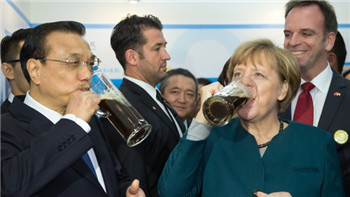(单词翻译:单击)

At the end of October, Li Keqiang, China’s premier, toasted Angela Merkel. He and the German chancellor cheerily clanked large tankards of German-style dark beer brewed by the students at Hefei University in eastern China.
10月底,中国总理李克强向德国总理安格拉默克尔(Angela Merkel)祝酒,两位领导人兴致勃勃地碰了碰各自手中的大号啤酒杯,品尝由合肥学院(Hefei University)学生酿造的德国黑啤。
Mr Li’s high spirits in Hefei were easy to explain. The EU’s most powerful leader revealed she was “in principle, positive” towards granting market economy status (MES) to China, offering fresh hopes that one of Beijing’s most prized ambitions could be realised in 2016.
李克强当时的好兴致是很容易解释的。作为欧盟(EU)最有影响力的领导人,默克尔表示对给予中国市场经济地位(MES)“原则上持积极态度”,这带来了新的希望,预示北京方面最重大的心愿之一有可能在2016年实现。
Still, Ms Merkel also admitted that MES was a double-edged sword. She warned that China still had work to do, particularly in the field of procurement contracts. Elsewhere on her trip, she cautioned that Europe’s steel and solar industries — seen as especially vulnerable to Chinese dumping — needed protection.
不过默克尔也坦承,市场经济地位是一把双刃剑。她警告说,中国仍有工作要做,尤其是在采购合同方面。在这次访华行程中的其他站,她也提醒说,欧洲的钢铁和太阳能产业需要得到保护(这两个产业被认为格外容易受到中国倾销的影响)。
Ms Merkel’s ambiguous message, tailored for both Mr Li and European industries, laid bare the EU’s tortured position over whether to grant MES.
默克尔传递出的含混信息——分别为李克强和欧洲工业界“量身定制”——暴露出欧盟在是否授予中国市场经济地位问题上的为难处境。
Diplomats and businessmen involved in the process say that the European Commission is likely to propose MES for the Communist state as early as February. The 28 member states and European parliament will then have to decide whether to approve that proposal. Britain is the strongest supporter of China, while Italy is adamantly opposed to MES.
参与相关事务的外交官和商界人士表示,欧盟委员会(European Commission)最早可能会在2016年2月提议赋予这个共产主义国家市场经济地位。之后,欧盟28个成员国和欧洲议会将需要决定是否批准这一提案。英国是中国最坚定的支持者,意大利则坚决反对赋予中国市场经济地位。
To its supporters, MES is a way to win favour in Beijing. This can smooth the course of EU factory investments in China and help boost Chinese financing of infrastructure in Europe.
在支持者来看,给予中国市场经济地位是赢得北京方面好感的好办法。这么做会减少欧盟企业在华投资建厂的障碍,也可以促使中国增加对欧洲基础设施建设的投资。
But critics argue that MES will kill traditional industries, including steel, ceramics and textiles, because it will become far harder to retaliate against Chinese dumping with countervailing tariffs. The left-leaning Economic Policy Institute in Washington has concluded that MES would endanger as many as 3.5m jobs in the EU.
批评者则称,赋予中国市场经济地位将毁灭欧洲传统产业,包括钢铁、陶瓷和纺织等,因为那时再要用反倾销税报复中国的倾销行为将困难得多。位于华盛顿、立场左倾的经济政策研究所(Economic Policy Institute)估计,假如赋予中国市场经济地位,欧盟境内多达350万个工作岗位将面临威胁。
Europe’s need to make a decision on MES next year is rooted in the terms of China’s agreement of accession to the World Trade Organisation in 2001. Beijing argues this accord means that it will automatically become a market economy at the end of 2016. The EU needs to decide whether it agrees with that interpretation.
欧洲之所以需要在明年就是否赋予中国市场经济地位做出决定,是因为2001年的中国加入世界贸易组织(WTO)议定书中列有相关条款。中国政府声称,根据议定书,中国将在2016年底自动成为市场经济国家。欧盟则需要就是否认同这一解释做出决定。
Europe’s traditional industries have led the campaign to deny China MES. The ㈠8bn ceramics sector says that as many as 100,000 jobs, or half the total it employs in Europe, are at risk. About 33,000 jobs were lost in the tableware sector in the seven years to 2011 before anti-dumping tariffs were imposed, according to Cerame-Unie, a trade body.
欧洲传统产业带头发起了抵制给予中国市场经济地位的宣传攻势。产值达280亿欧元的欧洲陶瓷产业声称,多达10万个工作岗位有危险了,占该产业欧洲用工总人数的一半。根据欧洲陶瓷工业协会(Cerame-Unie)的数据,在开征反倾销税之前,在截至2011年的7年里餐具产业损失了约3.3万个工作岗位。
“Our concern is not to protect markets, but to ensure a fair, level playing field and prevent injurious effects of unfair practices, like dumping and subsidies,” said Alain Delcourt, president of Cerame-Unie.
欧洲陶瓷工业协会会长阿兰德尔古(Alain Delcourt)表示:“我们所想的不是要保护市场,而是要确保公正、公平的竞争环境,防止倾销、补贴之类的不公正行为的有害影响。”
Volumes of Chinese steel entering Europe have nearly doubled over the past two years, according to Eurofer, the European Steel Association, even as demand for steel languishes. It warns of “massive job losses and plant closures” should MES be granted. “Already we have the most open market with less efficient [trade defence] tools than other regions, such as the US,” said Axel Eggert, director-general of Eurofer.
尽管钢铁需求疲软,但根据欧洲钢铁联盟(Eurofer)的数据,过去两年流入欧洲的中国产钢铁接近翻倍。该组织警告称,一旦赋予中国市场经济地位,将出现“大规模工作岗位流失和工厂关闭”。欧洲钢铁联盟总干事阿克塞尔埃格特(Axel Eggert)表示:“我们有最开放的市场,但我们的(贸易保护)手段不如其他地区有效,比如美国。”
His comment reflects widespread frustration with the European Commission for being slow to act against trade infringements. Business people often see Brussels as reluctant to use anti-dumping tariffs against China, as they can spark threats of counter-attacks from Beijing in unrelated sectors. Beijing, for example, threatened to clamp down on EU wine imports in 2013 in a dispute over solar technologies.
他的言论反映出,人们普遍对欧盟委员会迟迟不采取行动对抗不正当贸易行为感到不满。商界人士往往认为,布鲁塞尔方面不愿意对中国动用反倾销税,因为这样做可能促使北京方面威胁对不相关产业采取反制措施。例如,2013年,在围绕太阳能技术的贸易争端中,北京方面就威胁要限制对欧盟葡萄酒的进口。
Officials in the commission complain that industry is exaggerating the idea that the EU would be pulling down its defences, and some even expect that EU manufacturers higher up the value chain using cheap Chinese raw materials could profit from MES.
欧盟委员会官员抱怨称,工业界夸大了有关欧盟会放弃所有保护手段的说法。部分官员甚至预计,处在价值链较高端并且采用中国廉价原材料的欧盟制造商有望从中国的市场经济地位中获利。
EU trade officials say that other safeguards — including anti-subsidy measures — can be used against market economies such as the US and Russia. But companies complain that the burden of proof is far higher than in dumping cases. For anti-dumping cases, Brussels can prove Chinese prices are unfairly low by referencing prices in third countries. Subsidy inquiries can require documents as evidence, which are often impossible to obtain from China.
欧盟贸易官员表示,可以采用其他保护措施——包括反补贴措施——对付市场经济国家,比如美国和俄罗斯。企业则抱怨,与倾销案相比,这么做的举证负担要大得多。在反倾销案例中,布鲁塞尔方面可以参照第三国价格来证明中方价格过低。反补贴调查则可能会要求提供相关文件作为证据,而这些文件往往不可能从中国得到。
Hosuk Lee-Makiyama, director at the European Centre for International Political Economy, predicted a long fight. “Even if the EU starts the legislative process today, it’s unlikely to be ready for adoption before the 2016 deadline. Some member states are apprehensive of fair rules on anti-dumping to begin with, and would also manipulate their EU parliamentarians for that reason.”
欧洲国际政治经济中心(ECIPE)主任霍素克丠-牧山浩石(Hosuk Lee-Makiyama)预计,这将是一场旷日持久的斗争。“即便欧盟今天启动立法程序,也不太可能准备好在2016年截止日期之前实行。部分成员国首先就对反倾销的公平规则存在顾虑,它们也会出于这个原因左右本国在欧洲议会的议员。”


